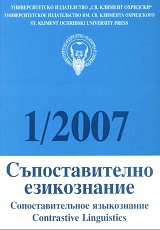Отглаголъние предлоги, виражающие отношение причини в широком смисле, в русско-чешском сопоставительном плане
Verbal prepositions that express the causative relations in a broad sense, in the Russian-Czech comparative plan
Author(s): Ladislav VoboržilSubject(s): Language studies, Language and Literature Studies, Theoretical Linguistics, Semantics, Comparative Linguistics, Western Slavic Languages, South Slavic Languages
Published by: Софийски университет »Св. Климент Охридски«
Keywords: semantics; deverbative prepositions; ussian-Czech comparative plan;
Summary/Abstract: On the base of semantics, the author devides the whole group of Russian secondary deverbative prepositions into two subgroups, the first of which expresses various subordinate adverbial relations, and the second - those of apposition. The attention is then focused on the former group of the semantic relations, on the adverbial causative relations in their broader sense. Especially, two of the relations are analyzed in detail - the adverbial causative relation in its narrow sense, represented by the preposition благодаря, and the adverbial concessive relation, expressed by the prepositions несмотря на, невзирая на. In the second half of the article, the way of translation of the above prepositions into Czech and Czech equivalents of the two prepositions, in general, are discussed. The loss of motivation of the original semantic relation in the process of translation is also taken into consideration.
Journal: Съпоставително езикознание / Сопоставительное языкознание
- Issue Year: 2007
- Issue No: 1
- Page Range: 13-19
- Page Count: 7
- Language: Bulgarian

